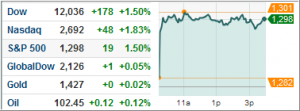Who cared about global hotspots and disasters? Yesterday, it was all about merger mania and excitement over AT&T’s intention to buy T-Mobile U.S.A. for $39 billion. The markets jumped right out of the gate, as the chart above (courtesy of marketwatch.com) shows.
The ETF equivalent of the S&P 500, SPY, added +1.55%, slightly more than its underlying index, while small caps (VB) took top honors by racing ahead +2.22%.
Emerging markets participated as well and VWO gained +1.79%.
Oil prices, gold and energy ETFs like VDE were higher in light of the ongoing violence in Libya, and political unrest in Bahrain, while interest rates rose.
The Dow managed to climb back above its 12,000 milestone mark, while the S&P 500 just fell short of conquering the 1,300 level again.
Global markets rallied along with the U.S. as news reports about one of the Japanese power plants was positive in that the crisis seems to be getting slowly under control, although some crucial repairs might take another few days to complete.
Given all that, Wall Street seemed simply oblivious to some horrific domestic economic news.
Existing home sales were down 10% from January, while the median price fell an amazing 5.2% from a year ago with 39% of the sales being distressed properties. Sales were weak all over, and the unsold inventory rose to 8.6 months.
That is in view of all of past stimulation gimmicks and record low interest rates. It supports my opinion that, despite hope to the contrary, real estate is a long way away from a recovery. Tight credit conditions and low appraisals have been the nail in the coffin for many transactions.
While the past few days were positive in the markets, I believe that volatility is here to stay for a while and directional turns can happen quickly depending on the severity of the event. Stay with your positions subject to your trailing sell stop points.
Contact Ulli

Comments 1
Don’t you love it, when Americans are in denial about bad economic news and all a dither about foreign affairs. It reminds me of Presidents: when they’re having difficulties domestically, they turn their attention to foreign policy. Usually, they lose the next election, if they are eligible to run for re-election, or if not, they leave office, being unpopular, with the people.
I think what this tells us, as investors is to pay more attention to foreign happenings, particularly foreign bad news, then domestic bad news. Seems wacky, but I think it’s just the way it is.